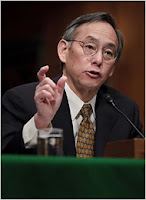 Chu says "second industrial revolution" needed in energy technology. Calls for Nobel-level "breakthroughs" in biomass, batteries and solar power to offer "better choices" in fight to overcome energy and climate challenges.
Chu says "second industrial revolution" needed in energy technology. Calls for Nobel-level "breakthroughs" in biomass, batteries and solar power to offer "better choices" in fight to overcome energy and climate challenges.
In a candid conversation with reporters yesterday, newly-confirmed Energy Secretary Dr. Stephen Chu called for "a second industrial revolution" in energy technology to overcome the world's energy and climate challenges.
Sounding rather familiar, Dr. Chu said solving these pressing challenges would require Nobel-level "breakthroughs" in at least three core energy technologies: advanced batteries for vehicles, new crops for biomass energy, and solar panels cheap enough to deploy without subsidy.
A Nobel Laureate himself and the former director of the Lawrence Berkeley National Laboratory, Chu is a forceful advocate of energy innovation and isn't afraid to publicly challenge the myth that "we have all the technologies we need to solve the energy challenge." On the contrary, the new Energy Secretary knows better than just about anyone the scale of the global energy and climate challenge and the critical role technology innovation must play if we are serious about overcoming that challenge.
In this latest conversation (audio available at the NY Times), Secretary Chu spoke eloquently about the critical role of science, technology and innovation in the fight against climate change, energy dependence and global poverty. "I think science and technology can generate much better choices" in this critical effort, the new Energy Secretary said. "It has, consistently, over hundreds and hundreds of years."
"We effectively need a second industrial revolution that gives us the energy we need, allows us to use it as efficiently as possible," and does not damage the climate, Chu said.
Settling into his new political role, Secretary Chu clearly recognizes the political challenges facing an effort to increase carbon prices to induce technological change - as well as the role that technology innovation to make clean energy cheaper can play in overcoming these challenges. According to the New York Times:
Dr. Chu said reaching agreement on legislation to combat climate change would be difficult in the current recession because any scheme to regulate greenhouse gas emissions would probably cause energy prices to rise and drive manufacturing jobs to countries where energy is cheaper."The concern about cap-and-trade in today's economic climate," Dr. Chu said, "is that a lot of money might flow to developing countries in a way that might not be completely politically sellable."
While Chu added that he still supports putting a price on carbon, he clearly sees an effort to make clean energy cheaper as critical to overcoming the political and technical challenges to tackling climate change.
Some climate advocates have steadfastly maintained that no technological breakthroughs are needed in core technologies like solar photovoltaics, but here Secretary Chu says:
"There should be a new generation of photovoltaics. The photovoltaics we have today, if you say without subsidy, and without even the additional cost of storage, it's about a factor of five higher than electricity generation by gas or coal. Suppose someone comes along and invents a way of getting ... solar photovoltaics at one fifth the cost, so you don't even think about subsidies anymore. You just slap it everywhere... That, in my opinion, would take something, which I would say, is a bit of a breakthrough."
Obama's much lauded new Energy Secretary also called for "a battery that's ten times better and cheaper than what we've got" and argued that a new "green revolution" was possible in the design of perennial crops that could provide a feedstock for affordable and sustainable biomass energy and biofuels.
Finally, like my proposal for a National Energy Education Act that would once again call on a new generation of young scientists, engineers and entrepreneurs to tackle the nation's energy innovation challenges, Secretary Chu sees climate change as, "an opportunity to draw young people into science and engineering."
Pointing to the Soviet satellite launch that sparked the Space Race and a period of rapid American innovation, he reminded reporters, "Sputnik drew young people into science and engineering because it was a security issue. [Climate change and fossil fuel dependence] is a world security issue... that will definitely affect us," the Secretary said. "So now you've got something," that can draw together the world's best and brightest "to figure out how to get this second industrial revolution ... this second green revolution" in clean energy technology.













1 comment:
There could be no better investment in America than to invest in America becoming energy independent! We need to utilize everything in out power to reduce our dependence on foreign oil including using our own natural resources. Create cheap clean energy, new badly needed green jobs, and reduce our dependence on foreign oil. The high cost of fuel this past year seriously damaged our economy and society. The cost of fuel effects every facet of consumer goods from production to shipping costs. After a brief reprieve gas is inching back up. OPEC will continue to cut production until they achieve their desired 80-100. per barrel. If all gasoline cars, trucks, and SUV's instead had plug-in electric drive trains, the amount of electricity needed to replace gasoline is about equal to the estimated wind energy potential of the state of North Dakota. There is a really good new book out by Jeff Wilson called The Manhattan Project of 2009 Energy Independence Now.
Post a Comment